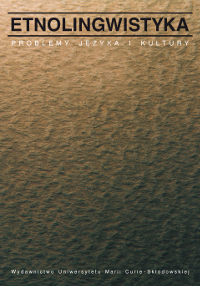Opozycja swoi/obcy w języku ginących społeczności Drzewian połabskich i pomorskich Słowińców
The US/THEM opposition in the languages of the extinct Polabian Drevani and Pomeranian Slovincians
Author(s): Hanna Popowska-TaborskaSubject(s): Language studies, Language and Literature Studies, Applied Linguistics, Cognitive linguistics, Philology
Published by: Wydawnictwo Naukowe Uniwersytetu Marii Curie-Sklodowskiej
Keywords: us vs. them; language of Polabian Drevani; language of Pomeranian Slovincians; self-identification; group identity; linguistic identity
Summary/Abstract: The author investigates linguistic manifestations of self-identification of the now extinct communities of Polabian Drevani and Pomeranian Slovincians. The analysis is based on the Etymological Dictionary of the Language of Polabian Drevani (containing all the preserved lexical items of the language) and accounts elicited from Slovincians in the second half of the 19th century. On the basis of Polabian lexis, the author concludes that the original division into US and THEM, based on ethnic or linguistic distinctions, was transferred to the social domain (the criteria of social status, wealth, profession etc.). For example, the Slavic *nemьcь ‘mute person’, then ‘a German’, began to denote a young man of a social status higher than that of a peasant. Slovincians, similarly to other Slavs, based their feeling of collective identity on linguistic identity. However, in contrast to Polabians, Slovincians were aware of the presence of Kashubians, fellow Slavs, to their east. Being separated from them by marshland, Slovincians were destined to live within their own culture. Characteristics of that culture, such as fishing methods, were resistant to German influences for a long time (e.g. the original lexis of fishing was preserved the longest). With encroaching Germanization, Slovincian was reduced to a fishing jargon, the circle of US becoming progressively more and more limited to fishermen.
Journal: Etnolingwistyka. Problemy Języka I Kultury
- Issue Year: 20/2008
- Issue No: 20
- Page Range: 215-222
- Page Count: 8
- Language: Polish

